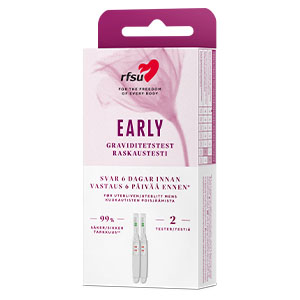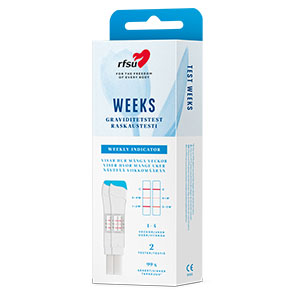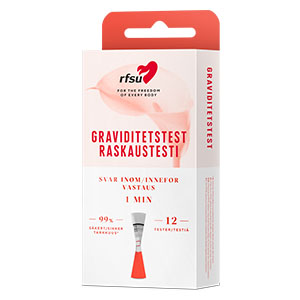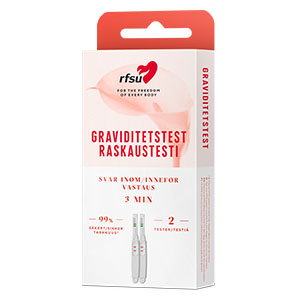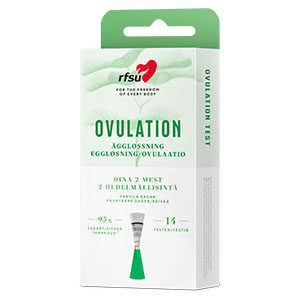
Signs of pregnancy – 13 common pregnancy symptoms
Some signs of pregnancy appear early - sometimes even before your period misses. Many people who have been pregnant recognise common pregnancy symptoms such as breast tenderness, fatigue or nausea. Here's a checklist of 13 common pregnancy signs to help you recognise if you're pregnant.
It is important to remember that signs of pregnancy can vary greatly from person to person. Some people experience clear pregnancy symptoms, while others hardly notice anything at all. Often the symptoms are so vague that they can be difficult to link directly to a pregnancy. If you want to be absolutely sure if you are pregnant, you need to take a pregnancy test as it is the only sure way to find out. Below is a guide to common symptoms when you are pregnant.
Common symptoms of pregnancy
1. Sore breasts and nipples – early sign of pregnancy
A tingling sensation, tense and sore breasts or darkening of the nipples can be one of the first signs of pregnancy. Some women also notice that the blood vessels on their breasts become more visible. It is the hormone progesterone that affects the breasts early in pregnancy. Many women also report that their breasts hurt differently from their periods, often more intensely and persistently.
2. Unusually tired – early pregnancy can make you extra tired
If you suddenly fall asleep on the sofa or can’t keep your eyes open after work, it could be a sign of pregnancy. The hormone progesterone rises sharply in early pregnancy and makes many people unusually tired. This fatigue is often strongest in the first weeks of pregnancy.
3. nausea and vomiting – common pregnancy symptom
Nausea is one of the most recognised symptoms of pregnancy. It can occur at any time of the day, not just in the morning. The cause is thought to be increased levels of hCG and other pregnancy hormones. Some women feel sick constantly, others only occasionally. Eating small and regular meals or having something to chew on can help.
4. needing to pee all the time – common early pregnancy sign
During pregnancy, blood volume increases and the kidneys produce more urine. In addition, the growing uterus presses against the bladder. This can make you need to pee more often than usual, both day and night, even in early pregnancy.
5. Headaches – hormone changes during pregnancy
Changes in hormone levels can lead to headaches, especially in early pregnancy. If you suspect you are pregnant, you should avoid medicines containing ibuprofen or acetylsalicylic acid. Opt for paracetamol if necessary, but do not use medicines without consulting your healthcare professional.
6. Increased vaginal discharge – common in early pregnancy
When the body produces more oestrogen, it can lead to increased, often watery, vaginal discharge. This is perfectly normal during pregnancy and is a way for the body to protect the cervix from infection. The discharge should be odourless and not cause irritation.
7. Stomach ache – period pain or pregnancy symptoms?
Many people ask: can you have period pains when you are pregnant? The answer is yes. A dull ache in the abdomen, especially in the lower abdomen, can be a sign of a growing uterus. It may feel like a regular period pain. The pain is often harmless, but if you experience bleeding or severe pain, you should contact your health care provider to rule out ectopic pregnancy or urinary tract infection.
8. Cravings for certain foods – pregnancy can affect appetite
Sudden cravings for specific foods such as orange juice, chocolate or savoury foods are common in early pregnancy. It can also be a case of losing your appetite for things you previously enjoyed. It’s the body’s hormones at work.
9. Constipation or loose bowels – stomach problems during pregnancy
Some people become constipated and feel bloated due to the hormone progesterone, which slows down digestion. Others, on the contrary, get loose in the stomach at the beginning of pregnancy. Both variants are common. Stomach upset can be one of the early signs of pregnancy, but if you are unsure or have persistent problems, you should contact your health care provider.
10. Metallic taste in the mouth – altered sense of taste during pregnancy
Some people experience a metallic taste in their mouth or an unexpected distaste for coffee, meat or other foods. This is a common symptom in early pregnancy and is linked to hormonal changes.
11. more sensitive to odours – a common sign of pregnancy
The smell of rubbish, perfume or cigarette smoke may be stronger than usual. Changes in the sense of smell are common and can occur very early in pregnancy.
12. Dizziness and fainting – caused by low blood pressure
Blood pressure often drops in early pregnancy. This can make you feel dizzy, especially if you stand up quickly. Make sure you eat and drink regularly and rest when your body tells you to.
13. Delayed or missed periods – the most obvious sign of pregnancy
Of all the signs, this is the most reliable. If you have a regular period and it doesn’t materialise, it might be time to take a pregnancy test. It is the only sure way to find out if you are pregnant or not.


